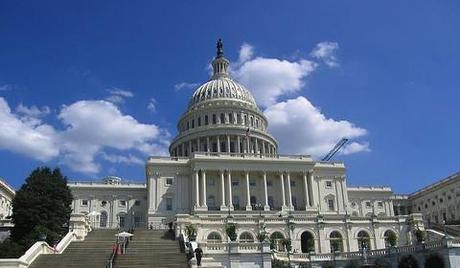
Not so sunny days on Capitol Hill. Photo credit: Will Palmer
America spun closer to defaulting on its debts after Speaker of the House John Boehner failed to unite fellow Republicans around a debt ceiling deal that would have faced certain defeat in the Senate anyway.
The US Congress has until August 2 to raise America’s $14.3 trillion debt ceiling, the Congressionally-imposed limit on the nation’s borrowing; if it doesn’t, the country risks either defaulting on its debts, a spectre that has markets quaking, or halting payment on government benefits, such as Social Security and veterans’ benefits, and federal salaries. It also means that a credit downgrade, the first in America’s history, is likely in the works, leading to interest rate hikes across the country. While both parties agree that the debt ceiling is necessary, they can’t agree on how to do it.
Plan C: The White House does have options if a compromise can’t be reached, including a short-term, 30 or 60-day extension, or a bill giving the President the power to unilaterally extend the debt ceiling.
- The plans. Boehner’s two-step plan involved first allowing short-term ceiling raise of around $900 billion coupled with around $1 trillion in spending cuts, followed by the establishment of a commission that would look to find additional savings in the coming months and the possibility of a $1.6 trillion debt ceiling hike. The White House and Democrats are against the plan because it could lead to yet another debt-standoff next year – election year – and because it wouldn’t offer the kind of market reassurance that investors need. The Ohio Republican tried to rally the GOP, including the fractious Tea Party contingent, around the plan this week, demanding in a series of closed-door and sometimes one-on-one meetings that they “get [their] ass in line”. His efforts, however, were to no avail – too few Republican representatives came over to his side. At the same time, however, the plan had no chance of passing the Democrat-controlled Senate, so several commentators are putting Boehner’s pushing the plan down to political theatre and an attempt to make the Democrats look like the roadblock.Senate Majority Leader Harry Reid’s plan, which has equally no chance of making it through the House, would raise the debt ceiling by $2.4 trillion, paid for in around $2.7 trillion spending cuts; the largest portion of those cuts would come from reduced spending on the US’s operations in Iraq and Afghanistan. The White House is behind the plan, Republicans, however, are not: Boehner claimed that Reid’s plan is “full of gimmicks”.
- GOP didn’t get their asses in line. In a major upset for Bohener’s authority, the recalcitrant members of his party did not heed his orders and “get [their] ass in line”. Those recalcitrant members are the more hardline Tea Party and libertarian types, the ones whose popularity won Republicans the majority in the House in the 2010 mid-term elections; they want deeper spending cuts to accompany this debt ceiling raise and won’t take “compromise” for an answer. Whether Boehner can pull them together for a yes vote on his plan by the end of Friday still remains to be seen.
- Harry Reid’s position strengthening. The only way forward for a Congressional solution is “compromise and crafty timing”, explained Karoun Demirjrian at The Las Vegas Sun, but the House’s inaction is also strengthening Nevada Senator Reid’s position: “The closer the Senate votes to that final hour [the August 2 deadline], the less time there will be for the House to push back.” Any compromise measure, Demirjian said, would come from Democrats and moderate Republicans: “If Boehner can’t come to the final hour with some sort of victory to claim, it forces his hand to accept that compromise, and the Democrats’ help, which hasn’t been what he’s promising to do.”
- Blaming both sides is a centrist cop-out – this is the Republicans’ fault. Paul Krugman, veteran New York Times columnist, claimed that the Republicans are holding America “hostage”, “threatening to undermine the economy and disrupt the essential business of government unless they get policy concessions they would never have been able to enact through legislation”, while the Democrats have “gone a long way toward meeting those Republican demands”. But the American media seems unable to acknowledge that this impasse is the Republicans’ fault, not the result of intransigence on both sides. Bernie Sanders, Vermont’s Independent Senator, claimed in an op-ed for The Wall Street Journal that Republicans want to lay the burden of deficit reduction to the poor, the working class, the elderly and children, in their fanatic determination “to protect the interests of the wealthy and large multinational corporations”. The Reid plan is bad, but the Boehner plan is worse and would result in major cuts from important, life-saving American benefits programmes. “Is it any wonder, therefore, that the American people are so angry with what’s going on in Washington? I am too.”
- Boehner, the Republican establishment are right. The Republican establishment is reasserting itself this week, declared Wall Street Journal columnist Peggy Noonan, and it’s right to – not only in this debt ceiling plan, but also in dragging the Tea Partiers away from the cliff and reminding it that the “true battles are in 2012”. The Republicans, she said, “have made great strides on policy”. And plus, “nobody loves Obama”. Conservative columnist Charles Krauthammer, writing at National Review Online, certainly doesn’t and he likes Boehner’s two-step plan: “It is all cuts, no taxes. It establishes the precedent that debt-ceiling increases must be accompanied by equal spending cuts. And it provides half a year to both negotiate more fundamental reform (tax and entitlement) and keep the issue of debt reduction constantly in the public eye…. It’s clean. It’s understandable. It’s veto-proof. (Obama won’t dare.) The Republican House should have passed it weeks ago.”

